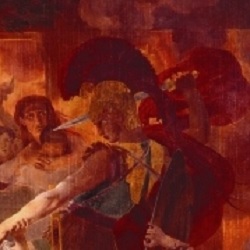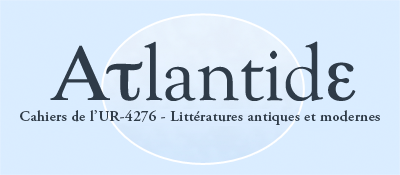 Ancient Tragedy Violence in the French Translations of Greek Tragedies (1692-1785)
Ancient Tragedy Violence in the French Translations of Greek Tragedies (1692-1785)
[Publication en ligne : 20 mars 2017]
Résumé : La tragédie grecque représente pour les dramaturges français du XVIIIe siècle une référence incontournable, dont l’autorité ne peut être remise en cause. Néanmoins ce théâtre se montre à bien des égards étranger à l’esthétique régulière construite à partir de la lecture d’Aristote. La question de la violence et de l’horreur, qu’ils distinguent, confronte en particulier les auteurs à un paradoxe : à la suite d’Horace, ils condamnent la représentation de l’horreur sur scène, mais certains constatent l’importance des effets violents dans le plaisir tragique procuré par le théâtre grec. Si les adaptateurs des pièces antiques peuvent contourner les difficultés en modifiant l’action dramatique, les traducteurs qui entreprennent alors de donner accès au texte grec original doivent prendre position dans des commentaires additionnels. Dans un contexte d’essoufflement du modèle classique, de découverte de Shakespeare et de promotion de la sensibilité, ces traductions et lectures du théâtre antique contribuent ainsi au renouvellement de la poétique en privilégiant l’intensité des émotions, par le biais des images scéniques et des effets paroxystiques.
Mots-clés : traduction, théâtre grec, violence, horreur, poétique classique, sensibilité, emotion, bienséance, plaisir tragique.
Abstract : For French playwrights in the eighteenth century, Greek Tragedy constitutes a key reference, one whose authority cannot be questioned. Nonetheless, this theatre proves to be in many respects a stranger to the aesthetics of regularity that developed from a reading of Aristotle. In particular, the question of violence and horror, between which these playwrights draw a distinction, confronts the authors with a paradox : following Horace, they condemn the representation of horror on stage, yet some of them point out the importance of violent effects in the tragic pleasure provided by Greek theatre. While the adapters of Ancient plays can get around difficulties by modifying the dramatic action, the translators who endeavor to give access to the original Greek texts must take up a stance in their additional commentaries. At a time when the classical model is flagging, French playwrights have discovered the talent of Shakespeare, and sensibility is increasingly favored, these translations and readings of Greek theatre contribute to the renewal of poetics in giving more importance to the intensity of emotions, aroused by stage images and paroxysmal effects.
Keywords : translation, Greek theatre, violence, horror, classical poetics, sensibility, emotion, bienséance, tragic pleasure.
Pour citer cet article : Tiphaine Karsenti, « Ancient Tragedy Violence in the Greek Translations of Greek Tragedies (1692-1785) », Violence tragique et guerres antiques au miroir du théâtre et du cinéma (XVIIe-XXIe siècles), Tiphaine Karsenti et Lucie Thévenet (dir.), Atlantide, n° 6, 2017, p. 10-20, http://atlantide.univ-nantes.fr
Articles dans le même numéro :
Avant-propos - Christian Biet & Fiona MacintoshIntroduction - Tiphaine Karsenti & Lucie Thévenet
The So-called “Vogue” for Outdoor Theatre around the Time of the First World War : Meanings and Political Ambiguities of the Reference to Greek Theatre
Aeschylus’ Persians to Denounce Modern Greek Politics
Ancient Drama and Contemporary Wars : the City Laid Waste ?
War, Revolution and Drama : Staging Greek Tragedy in Contemporary Portugal
To Tell the Trojan War Today : Contemporary Performances of Agamemnon
Filmic Analogies : the Trojan War in the Present. Notes toward an African Oresteia (Pier Paolo Pasolini, 1969), Troy (Wolfgang Petersen, 2004)
The Obscenity of Violence, the Obscenity of Theatre. The Dramaturgy of Carmelo Bene’s Last performance disconcertment
Kleist’s Penthesilea : a Warrior Caught up by Tragedy
Volume intégral - Violence tragique et guerres antiques au miroir du théâtre et du cinéma (XVIIe-XXIe)
&


